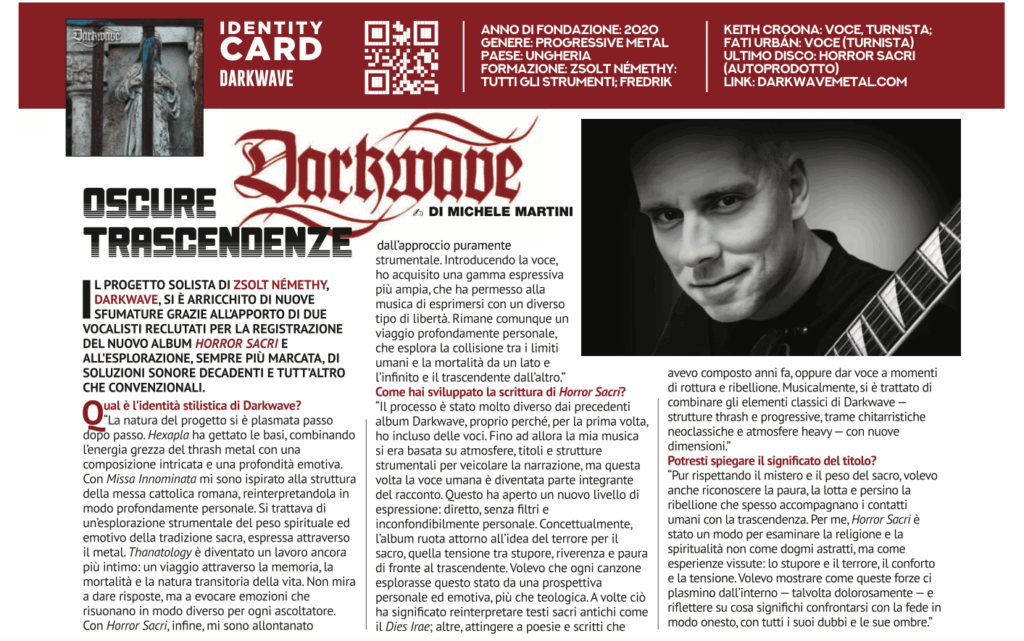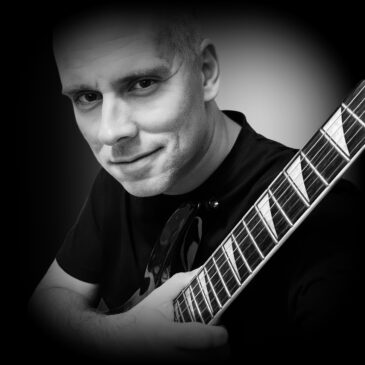As an independent artist, every small step forward is something you have to fight for — which makes it all the more meaningful when a prestigious, long-standing rock/metal magazine like Rock Hard Italy not only notices your work, but gives it space in print. The album review that appeared in their October issue was already an incredible gift; and now, another honor has followed, with a full interview published as well.
For a completely self-taught, underground solo project, this is more than a professional achievement: it’s a powerful affirmation that the music is capable of crossing boundaries and reaching people who might never have encountered it otherwise. The creation of Horror Sacri was a deeply personal journey for me — and seeing that story find its place in print, in a magazine regarded for decades as an authority within the metal community, is profoundly uplifting.
This article is not just about where I am right now. It’s about where this path leads — and how beautifully the music echoes back when it finally finds its way into the wider world.

Here is the English translation of the original Italian text:
Obscure Transcendences
Zsolt Némethy’s solo project, Darkwave, has gained new shades and depth thanks to the contribution of two vocalists recruited for the recording of the new album Horror Sacri, as well as through an increasingly focused exploration of decadent and decidedly unconventional sound solutions.
What is the stylistic identity of Darkwave?
“The nature of the project has taken shape step by step. Hexapla laid the foundation by combining the raw energy of thrash metal with intricate composition and emotional depth. With Missa Innominata, I drew inspiration from the structure of the Roman Catholic mass, reinterpreting it in a profoundly personal way. It was an instrumental exploration of the spiritual and emotional weight of sacred tradition, expressed through metal. Thanatology became an even more intimate work: a journey through memory, mortality, and the transient nature of life. It does not seek to provide answers, but to evoke emotions that resonate differently for each listener. With Horror Sacri, I ultimately moved away from a purely instrumental approach. By introducing vocals, I gained a broader expressive range that allowed the music to articulate itself with a different kind of freedom. Yet it remains a deeply personal journey, one that explores the collision between human limitations and mortality on one side, and the infinite and the transcendent on the other.”
How did you develop the writing of Horror Sacri?
“The process was very different from the previous Darkwave albums, precisely because, for the first time, I included vocals. Until then, my music relied on atmospheres, titles, and instrumental structures to carry the narrative — but this time, the human voice became an integral part of the story. This opened a new level of expression: direct, unfiltered, and unmistakably personal. Conceptually, the album revolves around the notion of fear before the sacred — that tension between awe, reverence, and terror when confronted with the transcendent. I wanted each song to explore this state from a personal and emotional standpoint rather than a theological one. Sometimes this meant reinterpreting ancient sacred texts like the Dies Irae; other times, drawing from poems and writings I had composed years earlier, or giving voice to moments of rupture and rebellion. Musically, it was about combining Darkwave’s classic elements — thrash and progressive structures, neoclassical guitar textures, and heavy atmospheres — with new dimensions.”
Could you explain the meaning of the title?
“While respecting the mystery and weight of the sacred, I also wanted to acknowledge the fear, struggle, and even rebellion that often accompany human encounters with transcendence. For me, Horror Sacri was a way to examine religion and spirituality not as abstract dogmas but as lived experiences: wonder and terror, comfort and tension.
I wanted to show how these forces shape us from within — at times painfully — and to reflect on what it means to confront faith honestly, with all its doubts and its shadows.”
And this is the transcript of the original Italian text:
Oscure trascendenze
Il progretto solista di Zsolt Némethy, Darkwave, si è arricchito di nuove sfumature grazie all’apporto di due vocalisti reclutati per la registrazione del nuovo album Horror Sacri e all’esplorazione, sempre più marcata, di soluzioni sonore decadenti e tutt’altro che convenzionali.
Qual è l’identità stilistica di Darkwave?
“La natura del progretto si è plasmata passo dopo passo. Hexapla ha gettato le basi, combinando l’energia grezza del thrash metal con una composizione intricata e una profondità emotiva. Con Missa Innominata mi sono inspirato alla struttura della messa cattolica romana, reinterpretandola in modo profondamente personale. Si trattava di un’esplorazione strumentale del peso spiritale ed emotivo della tradizione sacra, espressa attraverso il metal. Thanatology è diventato un lavoro ancora più intimo: un viaggio attraverso la memoria, la mortalità e la natura transitoria della vita. Non mira a dare risposte, ma a evocare emozioni che risuonano in modo diverso per ogni ascoltatore. Con Horror Sacri, infine, mi sono allontanato dall’approccio puramente strumentale. Introducendo la voce, ho acquisito una gamma espressiva più ampia, che ha permesso alla musica di esprimersi con un diverso tipo di libertà. Rimane comunque un viaggio profondamente personale, che esplora la collisione tra i limiti umani e la mortalità da un lato e l’infinito e il trascendente dall’altro.”
Come hai sviluppato la scrittura di Horror Sacri?
“Il processo è stato molto diverso dai precedenti album Darkwave, proprio perché, per la prima volta ho incluso delle voci. Fino ad allora la mia musica si era basata su atmosfere, titoli e strutture strumentali per veicolare la narrazione, ma questa volta la voce umana è diventata parte integrante del racconto. Questo ha aperto un nuovo livello di espressione: diretto, senza filtri e inconfondibilmente personale. Concettualmente, l’album ruota attorno all’idea del terrore per il sacro, quella tensione tra stupore, riverenza e paura di fronte al trascendente. Volevo che ogni canzone esplorasse questo stato da una prospettiva personale ed emotiva, più che teologica. A volte ciò ha significato reinterpretare testi sacri antichi come il Dies Irae; altre, attingere e poesie e scritti che avevo composto anni fa, oppure dar voce a momenti di rottura e ribellione. Musicalmente, si è trattato di combinare gli elementi classici di Darkwave – strutture thrash e progressive, trame chitarristiche neoclassiche e atmosfere heavy – con nuove dimensioni.”
Potresti spiegare il significato del titolo?
“Pur rispettando il mistero e il peso del sacro, volevo ache riconoscere la paura, la lotta e persino la ribellione che spesso accompagnano i contatti umani con la trascendenza. Per me, Horror Sacri è stato un modo per esaminare la religione e la spiritualità non come dogmi astratti, ma come esperienze vissute: lo stupore e il terrore, il conforto e la tensione. Volevo mostrare come queste forze ci plasmino dall’interno – talvolta dolorosamente – e riflettere su cosa significhi confrontarsi con la fede in modo onesto, con tutti i suoi dubbi e le sue ombre.”

